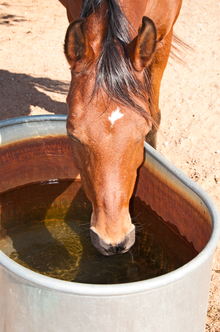During hot summer months and with drought blanketing the country, horse owners are being urged to make sure that horses are getting the water needed to guarantee good health. Water consumption is extremely important in the digestive process to avoid colic impaction, dehydration and other life threatening ailments.

Importance of plenty of fresh water for horses
Dehydration in horses is an extremely serious situation and can occur during strenuous exercise, stressful situations, or in cases of bouts of diarrhea.
The average horse needs 5 to 10 gallons of fresh water per day. A horse deprived of feed, but supplied drinking water, is capable of surviving 20 to 25 days. A horse deprived of water may only live up to 3 or 6 days. After lacking water intake for two days a horse may refuse to eat and exhibit signs of colic and other life-threatening ailments.
During summer months, horses are often engaged in more activity than during the colder winter months. This activity leads to the need for more water consumption. Lack of water consumption by the horse during this time of usage could lead to dehydration.
Dehydration in horses is an extremely serious situation and can occur during strenuous exercise, stressful situations, or in cases of bouts of diarrhea. The lack of water can include the lack of electrolytes. Electrolytes include the minerals sodium, chloride and potassium and the lack of electrolytes can lead to kidney failure in the horse, if the horse is not rehydrated quickly.
In addition to making sure your horse always access to plenty of fresh, clean, palatable water, you should recognize when your horse is becoming dehydrated and its fluid balances need attention.
Dehydration is often not recognized until 5 percent or more body weight is lost. Signs of dehydration are weakness, depression, sunken eyeballs, dry mucous membranes, slowed capillary refill time, and increased heart rate.
